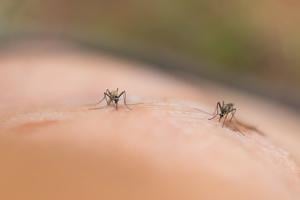Researchers at Radboud University Medical Center in the Netherlands have turned a major music festival into an unexpected laboratory, examining the factors that make some individuals more appealing to mosquitoes. Over the course of three days at the Lowlands festival in Biddinghuizen, hundreds of attendees participated in the “Mosquito Magnet Trial,” a study designed to evaluate personal attractiveness to these insects.
Inside pop-up laboratories constructed from shipping containers, participants engaged in a unique experiment. From 9 a.m. to 10 p.m. each day, they rested their arms against transparent acrylic boxes housing mosquitoes. A sophisticated camera and computer system monitored the insects’ movements, calculating a distinct attraction score for each participant based on their scent. The study included over 500 volunteers and produced a wide array of results, revealing intriguing relationships between certain behaviors and mosquito attraction.
Key Findings and Surprising Links
The preliminary findings, published on bioRxiv.org, uncovered several notable patterns. For instance, festivalgoers who had consumed beer were found to be 44% more attractive to mosquitoes compared to those who abstained from alcohol. Additionally, those who used cannabis also exhibited heightened appeal to the insects. Another interesting discovery indicated that individuals who had slept near another person the previous night scored higher in mosquito attraction.
Despite these intriguing results, researchers identified a straightforward method to reduce mosquito allure. Individuals who applied sunscreen were approximately half as attractive to the insects as their unscreened counterparts, suggesting that sunscreen may serve as an effective deterrent.
Felix Hol, the lead researcher, expressed his excitement about the public’s enthusiastic participation in the study. “You’d hear loud cheers when a score popped up on the scoreboard,” Hol remarked, reflecting on the lively atmosphere of the festival. His comments highlighted the community’s eagerness to engage with scientific research.
Limitations and Cautions
While the findings are captivating, Hol cautioned that they should be interpreted with caution due to the unconventional research setting. The festival environment introduced numerous variables that could influence the results. Furthermore, the study primarily involved a young, camping-oriented demographic, which may not accurately represent the general population.
The researchers acknowledge these limitations but emphasize the valuable insights gained into mosquito behavior. Hol humorously summarized the potential takeaways for those wishing to avoid mosquito bites: “don’t drink beer, don’t smoke weed, don’t sleep with people and put on your sunscreen.” Alternatively, he suggested, “You can do whatever you want and put on long sleeves.”
This study provides an engaging look at the factors influencing mosquito attraction and offers practical advice for individuals seeking to minimize their risk of bites. For further information on preventing mosquito bites, the U.S. Centers for Disease Control and Prevention provides additional resources.
The findings, while preliminary, shed light on the complex interactions between human behaviors and mosquito attraction, offering a blend of scientific inquiry and festival fun.
